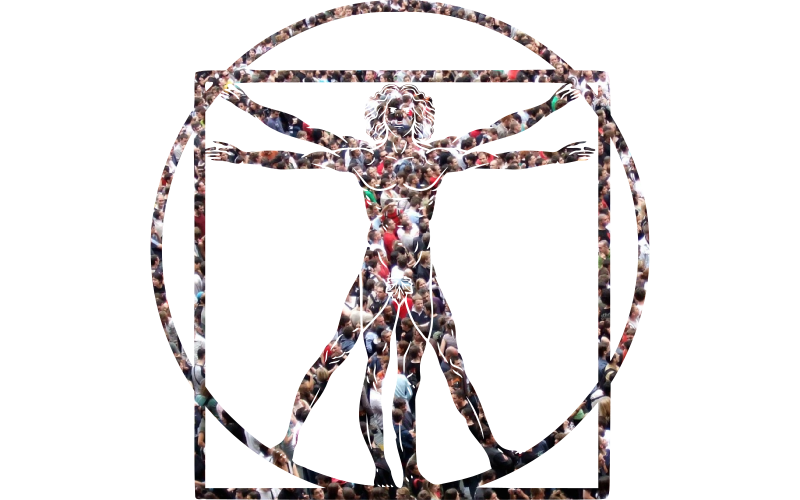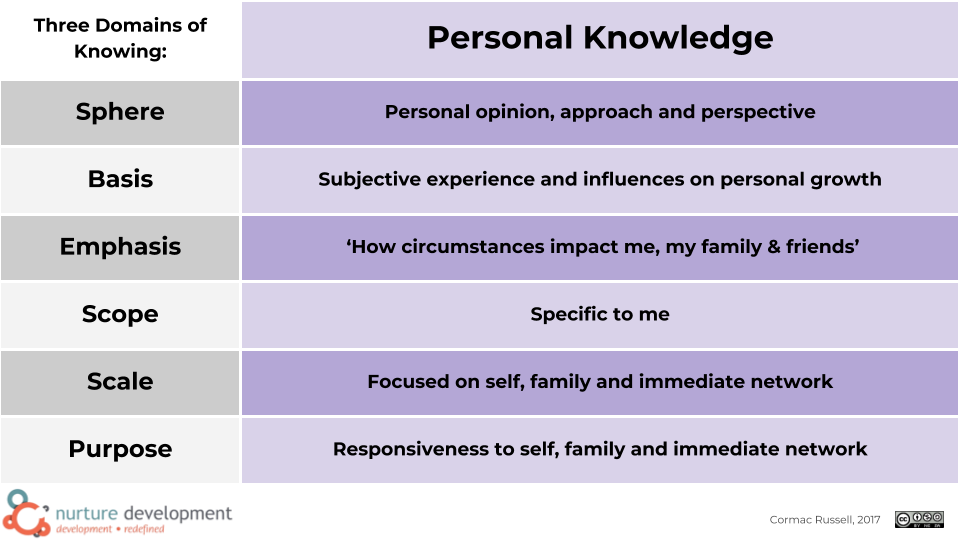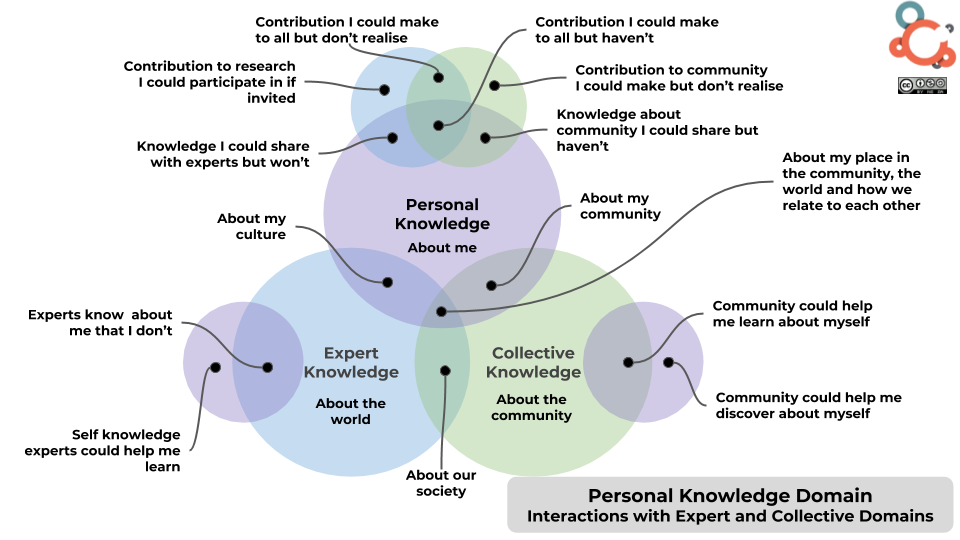
Personal Knowing: I know I need you and that you need me too – Part 4 of 5
The previous three posts in this series, dealt with expert and collective knowing. This post, part four in the series of five blogs, is concerned with personal knowing and how it relates to the other domains.
When it comes to personal knowledge, potentially there are as many starting points to this conversation are there are people on the planet. Is it possible to know anything in a truly personal way? Is personal knowing the same as individualised knowledge? Is personal knowing the same as private knowledge? Questions like these continue to be the purview of dense philosophical discourse. The answers are matters for deliberation, and perhaps the generic answer to each is that, “it depends”. What is certain in my mind, is that we are social, and embodied beings; therefore, from the latter stages in the womb to just short of the tomb, we know and understand reality in relationship to others, and how we experience and feel as we move through the world we inhabit.
The Importance of Narrative
Crucial to our ways of understanding our world and our place in it, are the stories we tell about ourselves and others. Most of these stories are inherited and therefore while carried by an individual; have not been weaved by them. Personal knowing requires a deep capacity to simultaneously show up in the world willing to reappraise received stories, and to reweave together with fellow citizens, new stories from the threads of olds ones.
Stories, whether received subconsciously, or critically reviewed, are social constructs, we do not suck them from our own thumbs. There is little doubt though, that we often personally generalise, distort and delete much from them, which in turn we confuse with the “whole truth” or “personal knowledge”, failing to see the very large dose of myth mixed in with random grains of truth. “This is my personal story”, we proclaim, but is it? Is it your personal truth about yourself, or someone else’s myth about you? Or simply, the truth as best we know it?
To re-emerge into the world ready to weave a new story we must believe we have something to contribute not just to ourselves but to others. If my inherited story is one of hopelessness; powerlessness; voicelessness; then I step into the world as a helpless, supine, victim of someone else’s labels about me. If I show up believing I am “somebody” then I arrive not as a subject (someone who has an allegiance to an external ruler), nor as a consumer (someone who has an allegiance to their consumer rights and ultimately the market place), but as a citizen (someone who has an allegiance to other citizens and the commons).
When I show up as a citizen I do so while recognising that I have personal gifts, skills and passions that I bring to the wellbeing of the whole, which are essential contributions to the community cake. When I feel confident in this (I personally know it), I am free to also recognise the same is true of everyone else. It is this personal knowing that enables me to understand that the threads of my story are interwoven with those of others, that the die is not cast, and that there are always multiple possibilities and alternative futures to be discovered and co-created. That’s the knowledge I bring to the collective and in moments of solitude from which I take solace. It is the same knowledge that keeps me hopeful in lonely times, and committed to others even when I dislike the myths they choose to share with the world.
A Story of how Personal, Collective and Expert Knowing can Interact
In the early 1950s as a young mum, Marian Tompson, one of the founder members of La Leche League International, knew she wanted to breastfeed her children, despite what the majority or others were saying, laypeople and experts. She rightly believed she knew best what was best for her children (personal knowing). But she needed support and so found seven other mums who shared her passion and they formed a mutual support group, which became the earliest members of what eventually emerged into the world as La Leche League International (collective knowing).
As that movement grew and breastfeeding became popularised, experts became increasingly involved in advising and trying to steward the movement towards institutional imperatives. In response Marion invited the assistance of Dr. Robert Mendelsohn to act as their medical authenticator; validating that as laypeople these mums were health creating in their own right. He also challenged professionals to lead by stepping back and desist from displacing mother-led inventiveness.
Personal knowing, understood this way, naturally orientates us towards the commons, where we choose to be accountable and committed to each other and the planet. Whether we carry a particular expert way of knowing, is secondary, the primary focus is on getting better at being human together, expert, collective and personal knowledge become the asset-base from which that alternative future is produced.
That said, for as long as expert knowledge is enthroned within institutions and not the commons, we must accept that the dynamics exemplified by the La Leche League International story – where institutions became colonising of civic space – will prevail. The reality is that institutions while doing incredible good in the world, are not benign and so in all kinds of unintentional ways they create inappropriate power dynamics that can overwhelm or undermine personal and collective knowledge outside the institutional space. The solution for ethical practitioners – like Robert Mendelsohn – is to occupy the gap between the institutional world and civic space, and to use their personal knowledge of the systems to mitigate its worst excesses and find ways to create space and resource for citizens to produce the things that matter to them.
Part 1: Three Domains of Knowing
Part 2: The Shift from Expert to Collaborator
Part 3: No Experts in Matters of Judgement
About the diagram: Knowledge Graph Key, Euler Diagrams.


